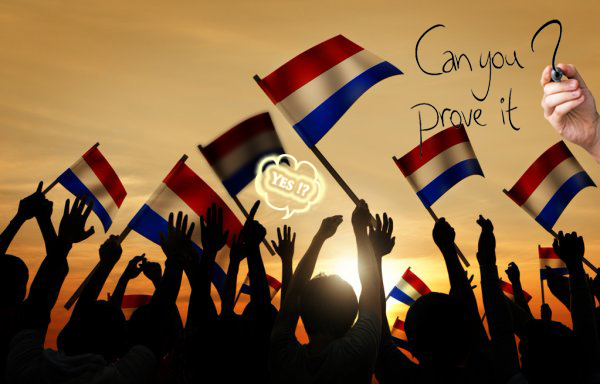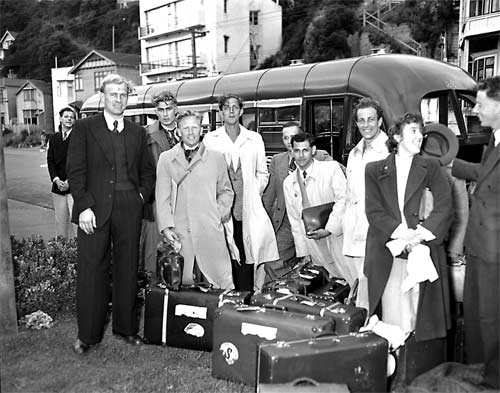Are you Dutch? Prove it!?

Napoleon?
Within the Netherlands there is a strong bureaucratic civil registration system controlled by the department of Burgerzaken (civil affairs) at each municipality. This stems from way back during the Netherlands’ Napoleonic period. Yes Napoleon was one of the co-inventors of big brother.
Ever since Napoleon if you move within the Netherlands your records move with you to the next municipality. Details recorded are birth, marriage(s), child(ren), divorce(s), death, nationality, residential addresses, etc. All these civil registration aspects are organised and regulated by law.
Your details are then also linked to the country’s tax office, welfare, etc. This makes it a well oiled governmental civic system (not everyone agrees and this comes with a little bit of sarcasm). Having such a great detailed civic registration system means that when you live in the Netherlands there is no question about your nationality status. The government knows your status! Or do they?
Recording one nationality only
As of 06 January 2014 the municipalities only record one nationality, and your Dutch nationality is the primary nationality to record. If you also have another nationality this is no longer recorded in the civil registry. Thus the authorities only can see your Dutch nationality when checking your records. Foreigners will only have their foreign nationality recorded on which they have residency rights through immigration. Other second, third, etc nationalities are not recorded anymore. Although sometimes there may be historic records on this from before 2014.
Dutch migrants and expats, prove your nationality!?
While living in the Netherlands there is thus in most situations no issue. You are clearly Dutch or a foreigner and your rights and duties are clear to the authorities. However, those who migrate, move residency to outside of the Netherlands, will be recorded as having left the municipality and country (uitschrijving) on a certain date (which can become very important) and after this their nationality status becomes less clear to the authorities.

Did the Dutch prime minister get honorary citizenship of South Korea?
No!? Are we sure about that?
Should we not ask him to prove he is really still Dutch?
It is possible, although rare, that a Dutch national, resident in the Netherlands, obtains another nationality without the Dutch authorities being aware of this. With that anyone in the Netherlands their nationality could be in doubt, see the question to the (former) Dutch PM. However, the bureaucratic civil registry does not consider this and does not, or rarely, questions a resident (Dutch national) their nationality.
Dutch nationals resident abroad have more opportunities to take on another nationality. The current Dutch nationality law states that when anyone gets another nationality they can automatically lose their Dutch nationality. Yes, even when the nationality is given to you as a gift. However, there are some limited exceptions to this loss. Ever since the advent of the Dutch nationality law of 1892 with major changes in 1985 and 2003 there have been slight different laws on this. It is complex and we won’t go into that here.
The Dutch authorities are sometimes informed by the other country of someone naturalising (getting their nationality). However, many if not most countries, do not pass this information on.
Therefore, the Dutch authorities never know for sure what someone’s nationality status is. They therefore can question someone’s Dutch nationality (at any time). They will consider a few aspects. Such as how long the person has been resident abroad. If they have a current and valid Dutch passport with a visa or residence permit for that country. And other such aspects which may indicate the person did, or did not, get another nationality.
And of course they will ask you the big question. Do you have another nationality? You will see this question on a passport application form. You will get the question when returning to the Netherlands and registering your residency at the municipality. You may get the question at border control. You may get the question when dealing with any Dutch authority. If you are just Dutch and you answer “no”, some may accept your answer and others may ask you to prove it. If you do answer “yes” you will possibly be asked to prove that you are still Dutch. Remember, getting another nationality may have meant you lost your Dutch nationality automatically, but not always the case. And then there is also the secondary method of loss (later) through the 13-Year Clock, previously 10-Years. More on that here.
Be honest!
Don’t try to hide your other nationality. If you are being asked a direct question answer truthfully. However, if you are not asked and you need some time to organise yourself, or get a legal opinion, and you are yourself not fully sure of your Dutch nationality status then you may want to do that first before you approach the authorities. Don’t forget that there are certain exceptions in law which may apply to you. Sometimes people get confused and they think they are no longer Dutch while they still may be. Authorities sometimes also don’t have all the information and at times come to incorrect conclusions.
It is your responsibility to prove your nationality
Yes, fair or not, it is up to you to provide the evidence that shows you are still Dutch, or that you lost your nationality in a certain manner on a certain date. As you may imagine, these aspects can become quite important.
I am only Dutch, believe me!
Imagine that you lost your Dutch passport and have no evidence of your visa or immigration status. Or, yes some Dutch nationals also sometimes live illegally in other countries and have no legal status in that country. When you are in that situation and do contact the embassy a suspicious Dutch official may be thinking you could have accepted the other nationality and don’t want to declare this. And even if this is not what they are thinking they are obliged to make sure. They can’t issue a Dutch passport if they are not convinced you are (still) Dutch. This can create the tricky situation that while in fact you may still be Dutch, you have no passport/evidence to prove this. Explain your situation and ask for help. (keep reading, especially the Evidence below).
I have another nationality and am still Dutch!
Similarly, you can be asked to prove that you did comply with the law through which by exception you are still Dutch. How? The necessary evidence differs per person per situation. You need to prove yourself that you complied with an exception in the law and are still Dutch. (keep reading, especially the Evidence below)
2nd, 3rd, etc generation of Dutch family abroad. Evidence?
The Netherlands is known for one of its most excellent export products of very nice lovely kind sociallable terrific Dutch migrants. Post WW2 this was especially the case when thousands of migrants were even encouraged by the Dutch government to migrate out of the country. They settled all over the world and at the time not always had the economic opportunities to return. Some did, some did not, some went back and forth a few times. Emotionally some had left for good, while others never wanted to lose their Dutch heritage, family, etc and may have regrets to this day.

Dutch nationality is passed from parent to child. And thus it is important to know that if the parent was Dutch at the time of birth, the child could have been Dutch as well. The current Dutch nationality law does not know any method to become Dutch based on ancestry. Nationality (normally) flows through the parent. Until 1985 nationality only passed from the father to the child, not the mother. However, this changed as of 1985 and since 2010 there is a special Option method for some children of Dutch mothers and foreign fathers born before 1985 without the Dutch nationality to obtain the Dutch nationality. Old gender discrimination fixed!
As you know from our 5, 10,13-Year Clocks info page, Dutch nationals, even though initially allowed to keep the Dutch nationality, can still later lose their nationality automatically, often unknowingly. Therefore, a Dutch migrant descendant may still be Dutch, or not. And if not, maybe their children are still Dutch? These can be complicated situations and it is your responsibility to prove your nationality which may involve proving your father and or grandfather’s Dutch nationality (or mothers’).
Your Evidence
Documentation and prove of immigration status, date of naturalisation(s), marriages, births, deaths, old passports, old formal declarations to wanting to stay Dutch, residency dates and confirmations from respective countries, etc etc. can all become very important. And not just for the person him/herself, potentially you need to go back and provef the Dutch nationality from prior generations. Keep it, trace it, retrieve it, save it, pass it on to your (grand)children.
Government’s own evidence!
The Dutch government does have some records on different aspects with respect to the Dutch nationality. Residency status is an important one which can be traced back generations. They keep reasonably good records on Naturalisations and Options. There are other important documents they archive. They do keep records of the issue of Dutch passports, but not indefinitely. Currently the issue of adult passports are only required to be kept on record for 16 years. You can request evidence from the respective Dutch embassy and/or municipality. However, the longer ago the more problematic this may become.
Save your evidence for future generations!
Therefore, our advise is that you collect and keep your own records. And to pass these records on to your (grand)children etc. Keep copies in a secondary location.
Dutch passport!? Evidence or not!?
A Dutch passport can be an important piece of evidence of your nationality. It even can restart that 13-Year Clock. However, it is merely a travel document. What it does do is confirm that on the date of issue the authorities believed your nationality status to be Dutch. Now, let’s hope they didn’t issue the passport by mistake. We all are mere humans and at times we all make mistakes.
A passport’s validity date does not mean that you will be Dutch until the expiry of the passport. You could get a passport on day one and on day two do something by which you automatically lost your Dutch nationality.
When renewing a Dutch passport you are asked to return the previous passport. If it is in your possession you should submit it with the application. However, you can also ask for the previous passport to be returned to you. The officials will consider your request and mostly return it to you invalidated. Of course you are smart enough and made some copies/scans of it before. It is important that you keep all your old passports. Keep in mind that the authorities currently are only required to keep records of issued passports for a maximum of 16 years.
Why? Oh why? Do I need to prove this myself?
Some people feel, understandably, a lot of frustration with all this. Shouldn’t the government know who is Dutch and who isn’t? Shouldn’t they prove your guilt,.. “innocent until proven guilty”? Unfortunately, while the frustrations and sadness is understandable the fact that the process of losing your Dutch nationality ‘status’ can be automatic and doesn’t involve a judge or official administrative process (as in many other countries is the case) the officials are caught out on this. Because possible loss depends on your actions you are required to evidence your own nationality status.
Human Being!
In our frustration we sometimes feel that other’s don’t value us, or our family, as human beings. Let me turn this around. Citizens also often don’t see that officials are human beings who are put in sometimes difficult situations. So, stay polite (you may still need them). Explain and discuss, ask for understanding, ask for superiors, ask for help, and if nothing avails explain politely that you don’t accept the official outcome/verdict/conclusion. Explain that you will want more time and the opportunity to gather more evidence, get legal assistance, etc. Ask for additional time for passport applications, etc. Warning, the only thing nobody can stop or pause is the automatic 13-Year Clock. So, ask for your rights and respect and give respect back. I know many officials who find this the most terrible aspect of their work. If they truly don’t seem to care address them on it but don’t lose your cool, and record it and get help.
No,… in writing please!
Don’t be send away without getting things in writing. If you are at the embassy/municipality applying for a passport ensure you get a written confirmation (addressed to you, no copies) on why they don’t want to process your application. Otherwise insist your application is accepted even though it may later be refused. We hear of many people who don’t even make it to an appointment because they are verbally told it is no use. Or when at the counter are send back with their application form as the application wasn’t sufficiently evidenced etc. If you do get a written reply by mail (often in Dutch) and it is not good news, don’t accept or let it go. Respond in writing, ask for extra time, or go and appeal the decision. There are likely deadlines mentioned in the letter.
They may be right!?
Unfortunately, yes often they are right and there is no use. It may be a waste of the application/processing fees, etc. Even though, it still may be good to show that you do not accept the conclusion.
Conclusion!
Some aspects of the above may seem ludicrous to some. In a way it is and can be. On the other hand these are very serious matters.
If you spend time abroad, if you were born abroad, or if you have/get another nationality, ensure you have the evidence you need. Ask your parents/family. When in doubt seek help. Start with the authorities. They sometimes can’t answer and may even advise you to seek legal assistance. Ahem!? Tadaaaaa! here we are! Do it, follow up, and don’t let time pass. Deadlines or clocks may be ticking.
There is light!
Know that even though the old principle of a single nationality is since 1892 the basis of the Dutch nationality law, over time politicians have created exceptions, conditions and altered the law in such a way that there are lots of possibilities to make the law more fair and better on families etc. The current law is in no way perfect and can of course be much better. It may not always be easy, it may be a practical difficulty, but where there is a will, there often is a way. Those who lost their Dutch nationality always have at least one possibility to regain their nationality.
And who knows, with the right votes and continued attention Dutch politicians may one day decide to join the majority of real modern and civilised countries. The Netherlands may one day be truly a modern country in an ever more international and globalised world.